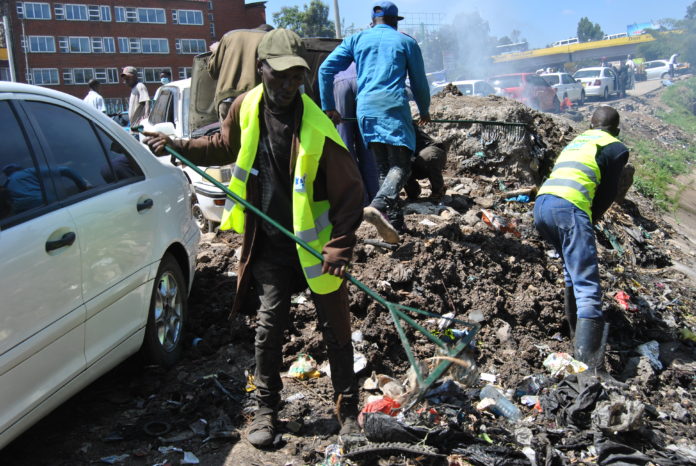Nairobi, January 22 — For more than half a century, John Mwangi has lived in the streets, the only place he’s known as being his home. He has seen it all here in his 56 years of life, including getting arrested and imprisoned, as well as losing his wife and sons who walked out of his life.
The father of two grew up an orphan after his parents died when he was only one year old and after being brought up by their neighbor, he finally gave up and resorted to street life. His only sibling, a brother, later died and he was then left without a family.
He never then got the opportunity to know his parents as they died while he was still too young.
“You know, here in the streets, sometimes you get napped by the police on the wrong side, not that you did anything wrong. And they take advantage to imprison you. That happened to me and after I came out, I found that my wife had left and gone to her rural home. I was in my 20’s then,” Mwangi says as he pulls a rake full of trash.
Today, he joins a group of other street families in cleaning up Nairobi city streets, something that is contrary to popular belief that street families are mostly responsible for the filth in the streets. And as he puts it, he understands the importance of a clean environment.
“Out here in the streets, we have witnessed our friends dying of diseases that were brought about by the dirt around where we stay. That’s why we feel the importance of at least cleaning it so that we can stop more deaths,” Mwangi says.
The cleanup had been organized by Plogging Kenya, an organization that is working to encourage people to pick up litter on their paths especially while on outdoor events such as jogging, walking, cycling, and hiking; that in most cases they organize for them.
The organization brought together climate activists and, companies, and other environmental enthusiasts to clean up along the Nairobi River, which is filled with filth and whose banks are home to many street children in the city.
The area is called Grogon, and according to Mwangi, it used to be too dirty but such initiatives to clean it have ensured that it continues to be tidy over time.

The organizer, Zablon Ogolla who is also the founder of Plogging Kenya also took part in the cleanup and says that the event was necessary in order to enable the street families to take responsibility for their own environment and ensure that their health is also good.
“You have to understand that a number of them are not environmentally conscious, and are not so concerned about a clean environment. And so if we bring an idea and partner with them, we will have achieved an objective as they will know that is important to have a clean environment and to segregate the same waste that we pick so that we can know the composition of the waste that we have picked. And as you can see, 99% of what we have picked is plastic. So, plastic is really choking our nation and it’s time we did something about it,” Ogolla says.
Also taking part during the street cleanup were the Kenya Association of Manufacturers, an umbrella organization whose members are largely responsible for the manufacture and distribution of single-use plastics that are, in turn, spoiling the environment. Its members have, from time to time, found themselves on the wrong side as environmentalists have accused them of being the ones making and distributing plastics through food, drinks, and other product packaging, without minding where the plastic waste ends up.
Sharon Okwany, the PET Sub-sector Liaison Officer at the Kenya Association of Manufacturers says that their members have resorted to creating awareness among the public on how to manage and dispose of the plastics after they sell them to the public.
“Yes, the plastics are produced and sold to the public through packaging, but the public is not aware of how they are supposed to properly manage and dispose of this waste at the end of the day. So, as KAM, what we try to do on behalf of our members is to create that awareness through cleanups, putting up bins in different areas, engaging in media campaigns, engage different partners who can bring in communities just to talk about proper waste management, and other different initiatives that we do,” Okwany says.

And as for Mwangi and his friends, they are happy that now they are going to live in a cleaner environment, and that people will no longer shift the blame on them for a dirty city.
“You know now, people will not be looking at us and saying that we are the ones spoiling the city,” Mwangi says as he smiles and enjoys a meal with his friends, provided by the partners at the end of the cleanup exercise.

